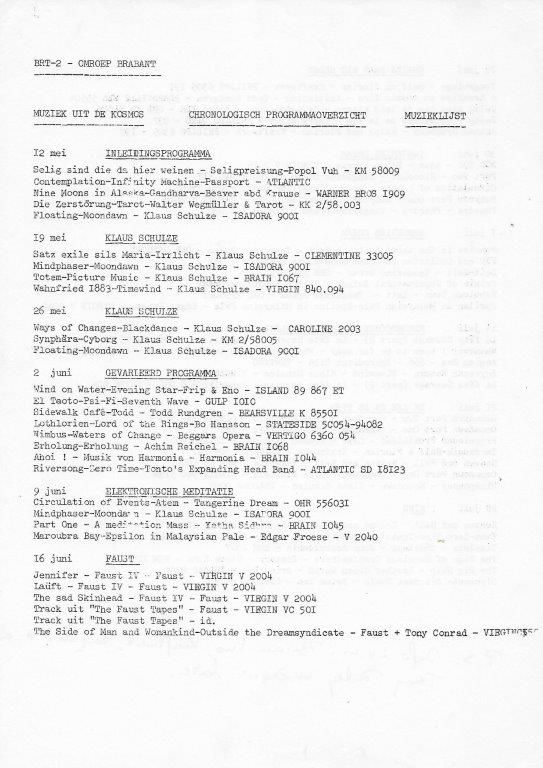Me and Popol Vuh
In the 70s radio was the only medium for me to discover new unheard music. I was very eager to listen to everything that was different from the mainstream.
Searching for interesting programs I became a frequent listener of programs broadcasted by Dutch, German and Belgian radiostations: ‘In Between’ by Michael Rüsenberg, who played a lot of jazz rock; ‘Rock in’ by Winfrid Trenkler had a focus on krautrock; ‘Superclean dreammachine’ (Ad Visser); 'Musica Nova' (Ton Hartsuiker) for modern composed music; ‘Kollage van Alledaags en Zeldzaam’, a very adventurous program combining classical and popular music.
And then there was ‘Muziek uit de Kosmos’, a Belgian program dedicated to ‘Berlin school’ electronic music and so called ‘cosmic music’. It was through this program that started in 1976, that I first heart of Popol Vuh, and many other groups as wells. I was a listener for about two years. In the case of Popol Vuh I do not have a cleat memory of my first encounter with this music. Only in the case of Magma I still remember the moment I first heart this music that completely puzzled and fascinated me (Super Clean Dream Machine).
'Where does this music come from?' became my leading question. Not geographically of course, but existentially. I searrched for an answer but above all I wanted the question to remain a question and an expression of wonder.

I do remember often asking myself while listening to music of Popol Vuh ‘where does this music come from? ‘ Not geographically of course, but existentially. With this question I articulated my fascination for this music that had a very distinct character for me. A depth I didn’t find in other music in those years. Being myself a religious searcher, I suspected this music coming from similar regions. Later I tried to problematize this, asking myself what is religious or spiritual music? What is it that makes music to spiritual music? I found no satisfying answers, only the questions changed.
Anyway, somehow the music resonated with me, with aspects of myself that I still had to discover.
Growing up in a small village it was difficult to find information on this group. In the local library only one serious music magazine was available: Muziekkrant OOR. At the beginning of the 80s I moved to a city starting my career as a university student things changed. I started to buy Popol Vuh records in het local record shops. Started corresponding with music friends from different countries, exchanging recordings of live tapes, bootlegs, records, etc. Writing to record labels for information. I never received an answer. Based on the sparse information I gathered, I wrote an article for the Dutch KLEM-magazine (Klub Liefhebbers Elektronische Muziek), a magazine dedicated speciaily to German electronic music.
Discography (seventh edition)
